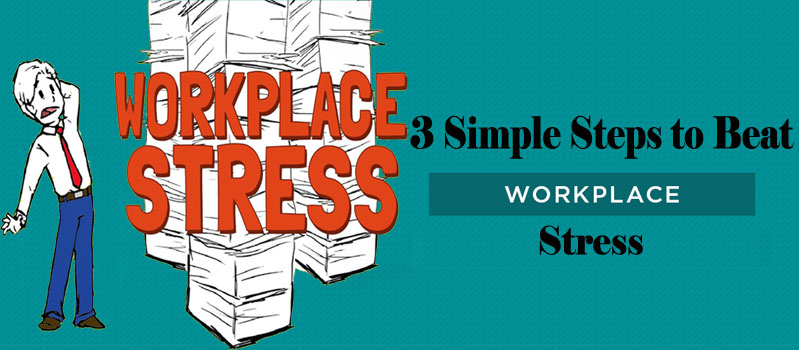Mild stress at workplace is normal, but excessive stress can interfere with your productivity, physical and mental health and personal life. If you do not address stress signs as soon as possible, you are likely to fall prey to diseases. According to the Health and Safety Executive (HSE), almost 500,000 people across the UK have reported that organisational stress makes them ill.
A little amount of stress is necessary as it helps you stay focused, alert and energetic and improve your productivity, but over the years, organisations have made the work atmosphere so unhealthy that everyone including those who love their jobs feels it like hell. Tight deadlines, long hours, increasing demands, office politics and job insecurity make you teed off.
In fact, most of the workers feel that the claws of dread clasp their spine as the working hours begin. With fear and anxiety, it seems convoluted to work and after a certain point you give up. Well, does it work out? Needless to mention, it is essential that you identify stress triggers to come to grips with them instead of leaving hopes.
Common precursors of workplace stress
There might be several causes of work-related stress depending on the job role and your perspective. Some are stressed out because of low salary and they are not finding a good job. Some are disappointed as they do not love their work, but the HSE has identified some other causes of occupational stress:
When a job becomes over demanding, it becomes difficult for staff to cope with the amount of work. In order to meet the deadline, they commit several mistakes that they end up with a barrage of criticism.
Lack of support from managers, employers and colleagues make workers tensed. It is imperative that they discuss issues with their managers as and when they feel so, but they do not.
Poor work relationshipalso mounts up the level of stress. Poor trust, governance and dominance cause frustration.
Employees feel anxious as they do not know how their role fits the organisation and what is expected of them, and some workers face difficulty adapting to changes because organisations do not give them much time.
What steps you should take to manage stress
When you feel overwrought and lose confidence, you should immediately start dealing with it. Here is how you can get over it:
Take the matter to management
Management always assumes that everything is going perfect as long as you remain silent. Some organisations conduct quarterly meetings to encourage employees to put forth issues they suffer, but they keep their lips sealed. You do not need to have fear that you will be sacked, but rather you should express your concerns. Your employers will figure out ways only when they know what the problem is.
Sometimes you can deal with the situation without involving your seniors. For instance, if somebody tries to dominate you or pick holes in your work for no reason, you should raise your voice to put forward your outlook, but remember that you have to be as ceremonious as possible. If the situation is still out of control, you can go to the HR manager to inform.
Stress not only affects your productivity but also acts against the interest of your company. Suffering alone will never help you and therefore you should not be afraid of telling your employer that what costs your performance. If you openly discuss everything, your employer will not only get to know about the root of the problem but will be happy to know that you are trying to find out a solution rather than let the business suffer.
Accept that you cannot control it every time
Of course, no organisation can be perfect. Some may be strict with timings and some may be strict with your pays. Such issues are worthless paying attention as these are external sources of stress. You have no control over them.
These sources may also include family problems. Personal problems like managing finances, buying home can affect your professional life. Experts suggest that you should not let them engulf you, but it does not mean that you will not make efforts to resolve those problems.
Have a stress buster plan
Good nutrition, proper sleep and exercise are good ways to cope up with stress. By following a healthy diet plan, you will feel stronger. Try to find out what helps you attenuate stress. Writing a stress management plan can help you add several ways to deal with it.
Try to do those activities that you enjoy most. It will divert your mind and reduce negative feelings. Implement those activities in your daily life so that you stay calmer. You do not need to be afraid of tight deadlines if you have already known what to do and how to do. Make a work plan with your manager to know what is expected of both of you. It will whittle down anxieties on both sides.


